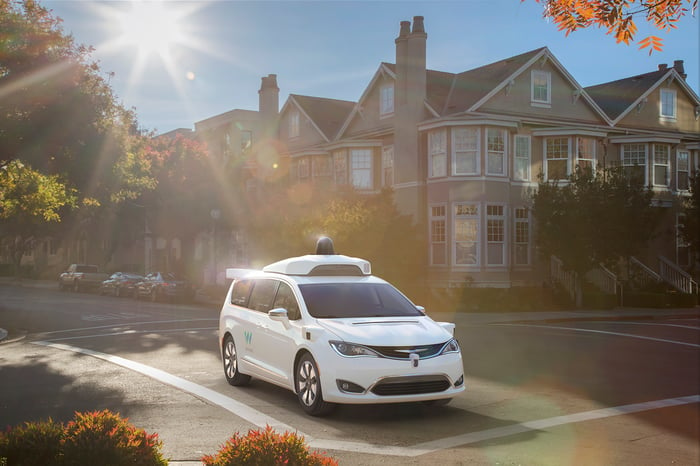Alphabet (GOOG -1.10%) (GOOGL -1.23%) subsidiary Waymo escalated its war against Uber Technologies over the weekend: Waymo and Uber arch-rival Lyft announced that they have struck a deal to work together to develop autonomous-vehicle technology.
Waymo and Lyft didn't say much beyond that. Here's what we know, and how this is likely to play out.

Waymo's growing fleet of self-driving Chrysler Pacifica Hybrid minivans could be put to work with Lyft later this year. Image source: Alphabet.
What we know about the Waymo-Lyft deal
The announcement was very short on detail. Here's the complete statement I received from a Waymo spokesperson:
We're looking forward to working with Lyft to explore new self-driving products that will make our roads safer and transportation more accessible. Lyft's vision and commitment to improving the way cities move will help Waymo's self-driving technology reach more people, in more places.
The Wall Street Journal, citing a person familiar with the deal, reported that Lyft will help Waymo expand the testing of its driverless-car technology, possibly by adding Waymo-equipped vehicles to Lyft's pool of available rides.
As of right now, we don't know any more than that.
What Waymo gets out of the deal: Data!
Waymo has logged roughly three million miles of autonomous driving on public roads, but most of those roads were in northern California, near Alphabet's headquarters in Mountain View. Working with Lyft will (presumably) give Waymo the ability to run its self-driving test vehicles -- and collect data -- in urban environments around the country that may be very different from Silicon Valley.
What Lyft (maybe) gets out of the deal: Tech
Lyft is already working with General Motors (GM -0.17%), which owns 9% of the ride-hailing company and is thought to be preparing for a large-scale test of self-driving Chevrolet Bolt EVs in Lyft service.
But working with Waymo will presumably give Lyft exposure to a second development effort, one that seems to be very advanced. GM's autonomous-vehicle technology is thought to be quite good. But Waymo's might be even better -- possibly the best available.
At minimum, it's certainly different from GM's, with different strengths, and working with it will give Lyft a better perspective on its available options.
If nothing else, it moves Lyft's self-driving effort forward at a moment when rival Uber's is stalled because of the litigation with Waymo.
What's this war with Uber about?
Waymo, formerly known as the Google Self-Driving Car Project, has been locked in a fierce legal battle with Uber for several months. In a nutshell, Waymo alleges that the head of Uber's self-driving research program took proprietary technology secrets with him when he left Google early last year -- and that he has made them available to Uber.
The litigation is still in its early stages, but the facts that have emerged so far don't look good for Uber.
Doesn't Waymo have its own fleet of self-driving vehicles?
Yes. Waymo has a brand-new (and expanding) fleet of Chrysler Pacifica Hybrid minivans equipped with the latest prototype version of its self-driving system. Fiat Chrysler Automobiles (FCAU) delivered 100 of the specially modified Pacificas to Waymo late last year, and it announced last month that it will build another 500 for delivery later this year. Those Pacificas might be well-suited to go into service with Lyft.
Waymo has also had discussions with Honda (HMC -0.90%) about a similar arrangement to supply test vehicles to Waymo's fleet, though no deal has been announced.

GM CEO Mary Barra with a self-driving Chevrolet Bolt EV at an event last December. GM is expected to produce "thousands" of prototype self-driving Bolts for a large-scale test with Lyft in the coming months. Image source: General Motors.
How does this hurt Uber?
Both Uber and Lyft are losing money. For both, the route to profitability probably involves replacing their crowdsourced human drivers with automated vehicles. That makes it a race: Who will be first to roll out self-driving taxis on a large scale in the U.S.? The winner stands to dominate a potentially huge space.
Uber has been working on developing its own technology for a while now. It has had a small number of self-driving prototypes operating in its service since last summer. But its technology is thought to be well behind that of Waymo, GM, and others -- and the potential restrictions that could emerge from this litigation won't help.
Meanwhile, Lyft wasn't even in the race until it joined forces with GM early last year. That put it in a good position to compete with Uber's effort. Working with Waymo will only improve its competitiveness.
What's next for Waymo and Lyft?
We don't know. I expect that the two will announce a pilot program in which Waymo-equipped vehicles enter Lyft service in one or more American cities later this year. But we won't know for sure until the companies decide to tell us more.





